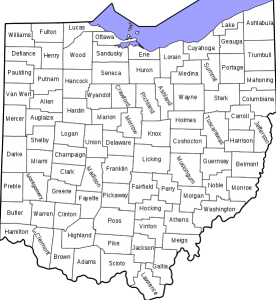In May 2019, the Ohio State Bar Association’s Corporation Law Committee submitted a report on Ohio’s Commercial Docket program to the Association’s Council of Delegates. The Committee also submitted a resolution for further study on expanding and firming up the Commercial Docket structure. A copy of the report and resolution can be found here.
In 2009, Ohio’s Supreme Court created temporary rules for Commercial Dockets, which rules were made permanent in 2013. Ohio Superintendence Rule 49.01 provides that an Ohio Court of Common Pleas can establish a Commercial Docket if it has at least six general division judges or is located in a county with a population above 300,000. Each eligible county’s trial court judges have the power to decide if they want to implement and/or maintain a Commercial Docket.
Commercial Dockets originally were established in the Cincinnati (Hamilton County), Cleveland (Cuyahoga County), Columbus (Franklin County), and Toledo (Lucas County) Courts of Common Pleas. Toledo has maintained a Commercial Docket since 2009. Cleveland had a Commercial Docket from 2009-2015 and then, after a three year hiatus, renewed its Commercial Docket in 2018. The Columbus judges voted 9-8 to terminate their Commercial Docket in 2012. The Cincinnati Commercial Docket terminated in 2017, after its two Commercial Docket judges were not replaced. The Committee’s report identifies various issues raised about the Commercial Dockets relating to these discontinuances.
The Committee itself identifies its “two primary concerns … with the current commercial docket system.” First, “the system is not mandatory, and therefore its availability is inconsistent.” Thus, as noted above, each county’s judges can vote as to whether the Commercial Docket should continue. The Committee believes that non-mandatory jurisdiction creates inconsistencies for lawyers and business owners, “contradicting the basic reasons for the Commercial Docket.”
Second, “the system is limited in its availability to certain counties thereby making the system unavailable to businesses in counties throughout Ohio.” The Committee believes it is important “to assure the [Commercial Docket] is available to all litigants throughout the State of Ohio. While the voluntary system provides the opportunity for certain counties to take part in a Commercial Docket, the current system is not available to the vast majority of counties in the state. These parts of the state do not have the option of participating in the current Commercial Docket system.”

The Committee’s proposed resolution calls “for the adoption of a commercial docket or a similar procedure designed for the resolution of business disputes by judges experienced with or trained to handle such matters throughout Ohio pursuant to such rules, laws or regulations as determined by the state legislature in conjunction with the Supreme Court of the State of Ohio.” Under the resolution, the Ohio State Bar Association would work with the Supreme Court, state legislature, and other interested parties to make recommendations toward implementing a business court that has a more permanent nature and broader presence across the state. The study will also address issues surrounding judicial selection, and the affects Commercial Dockets might have on judges, ranging from the election process to caseloads.
It is our understanding that a study is proceeding.
